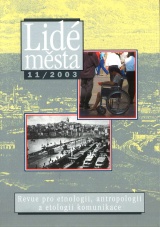Analýza sousedství, především s Romy
(Výsledky sekundární analýzy dat z výzkumů Evropské hodnoty 1991, 1999 a ISSP Religiozita 1999 za Českou republiku)
DOI:
https://doi.org/10.14712/12128112.4312Abstrakt
ln the Czech sociology, the issue "neighbourly relations" is not often a focus of examination, although it can contain a large quantity of valuable knowledge. The text contributes to the analysis of neighbourly relations on the basis of a comparative analysis of three representative sociological surveys conducted in the Czech Republic in the 1990s. The analysis focuses mainly on the neighbourly relations with Romanies, an ethnic group considered as most problematic in Czech society. The knowledge was based on the following surveys: The European Value Study from 1991, the same survey taken in 1999 and the research Religiousness from the series of the ISSP, also from 1999. A comparison of results of a research of unwanted neighbourly relations has revealed that the biggest problems are connected with the neighbourly relations with serious alcoholics, drug addicts, people with a criminal record and Romanies. They were followed as unacceptable neighbours much behind them by political extremists, people who contracted AIDS and homosexuals. The rejection of neighbourly relations with immigrants, including foreign workers, only relates to about 20 % of the population in the Czech Republic. The rejection of mentally ill neighbours is at about the same level. Moslems as neighbours are unacceptable for about 15 % of the population. Members of a different race are unwanted as neighbours by only about 7 to 10 % of the population. The smallest rejection as neighbours was displayed in the case of very large families and Jews - it only relates to approximately 5 % of Czechs. lt is significant that out of the 14 groups under observation, there was a fall in the negative position in 12 of them between 1991 and 1999. This means that Czech society is much more tolerant of "others" in 1991 than in 1999. An analysis of relationships (including a factor analysis) has made it quite clearthat these are interrelated types of neighbourly relations. ln fact, they make up a monolithic group with a core in the association of neighbourly relations with Romanies and at the same time with people with a criminal past. This analysis, too, has confirmed that the relationships of the majority and the Romany minority do not have only (or even solely) an ethnic background, but they also include serious social attributes, linked in the majority population with the Romanies' life style.
Stahování
Publikováno
Jak citovat
Číslo
Sekce
Licence

Tato práce je licencována pod Mezinárodní licencí Creative Commons Attribution-NonCommercial-NoDerivatives 4.0.


